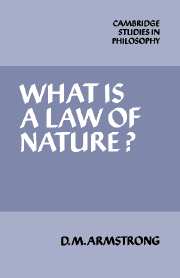Book contents
- Frontmatter
- Contents
- Acknowledgements
- PART I A critique of the Regularity theory
- PART II Laws of nature as relations between universals
- 6 Laws of nature as relations between universals
- 7 Functional laws
- 8 Uninstantiated laws
- 9 Probabilistic laws
- 10 Further considerations concerning the form of laws
- 11 Are the laws of nature necessary or contingent?
- Conclusions
- Works cited
- Index
6 - Laws of nature as relations between universals
Published online by Cambridge University Press: 05 June 2012
- Frontmatter
- Contents
- Acknowledgements
- PART I A critique of the Regularity theory
- PART II Laws of nature as relations between universals
- 6 Laws of nature as relations between universals
- 7 Functional laws
- 8 Uninstantiated laws
- 9 Probabilistic laws
- 10 Further considerations concerning the form of laws
- 11 Are the laws of nature necessary or contingent?
- Conclusions
- Works cited
- Index
Summary
THE NEED FOR UNIVERSALS
It will be assumed from this point onwards that it is not possible to analyse:
(1) It is a law that Fs are Gs
as:
(2) All Fs are Gs.
Nor, it will be assumed, can the Regularity theorist improve upon (2) while still respecting the spirit of the Regularity theory of law.
It is natural, therefore, to consider whether (1) should be analysed as:
(3) It is physically necessary that Fs are Gs
or:
(4) It is logically necessary that Fs are Gs
where (3) is a contingent necessity, stronger than (2) but weaker than (4). My own preference is for (3) rather than (4), but I am not concerned to argue the point at present. But what I do want to argue in this section is that to countenance either (3) or (4), in a form which will mark any advance on (2), involves recognizing the reality of universals.
We are now saying that, for it to be a law that an F is a G, it must be necessary that an F is a G, in some sense of ‘necessary’. But what is the basis in reality, the truth-maker, the ontological ground, of such necessity? I suggest that it can only be found in what it is to be an F and what it is to be a G.
In order to see the force of this contention, consider the class of Fs: a, b, c … Fa necessitates Ga, Fb necessitates Gb … and so on.
- Type
- Chapter
- Information
- What is a Law of Nature? , pp. 77 - 110Publisher: Cambridge University PressPrint publication year: 1983
- 1
- Cited by



